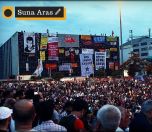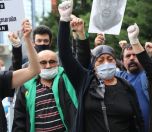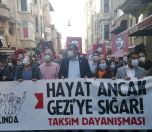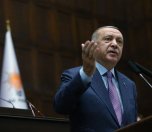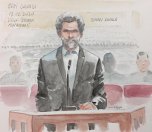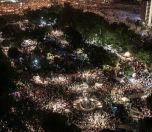* Photos: Dada Verd and Barış Karadeniz / Flickr
Click to read the article in Turkish
Today is May 28, 2020. Today marks the 7th anniversary of Gezi Resistance, which started in Taksim to prevent the demolition of Gezi Park for an Artillery Barraks and a shopping mall and to protect the trees. The protests soon spread from a small park in İstanbul to almost all cities of Turkey.
CLICK - First Year of Gezi Resistance
Seven years ago in Gezi Park, a 3-meter part of the wall facing Asker Ocağı Street was demolished and 5 trees were uprooted. Around 70 people, together with Taksim Solidarity platform, wanted to prevent the demolition by standing in front of construction equipments.
Sırrı Süreyya Önder, the MP of the then Peace and Democracy Party (BDP), also came to the park, got in the way of equipments attempting to uproot the trees and tried to prevent the demolition.
As a result of the calls made on social media, more and more people started to come to Gezi Park and its vicinity. The protesters set up tents in the park and started keeping watch to protect the trees.
On the same day, the group woke up to the attack of the police with pepper gas. In the morning on May 29, police officers intervened against the ones in the park, ripped off the tents and set them on fire. Protesters set up new tents in place of those burned down by the police.
On May 30, police officers attacked the ones staying in the park, again. Their attacks continued in the following days as well. Some protesters were injured by the attacks of the police with pepper gas. Next morning, the police raided the park. Attempting to disperse the group with physical intervention, they caused the protests to spread even more.
Due to the "unproportional" violence used by the police, dozens of people, including MPs of the time, were injured. Three people lost their eyes. Among the injured were also MPs Sırrı Süreyya Önder and Sezgin Tanrıkulu. Lobna Allami was seriously injured by the gas cartridge fired by the police. As the hospitals in the vicinity fell short of treating all of the wounded, the Turkish Medical Association (TTB) set up a medical unit in the park.
dozens of people, including MPs of the time, were injured. Three people lost their eyes. Among the injured were also MPs Sırrı Süreyya Önder and Sezgin Tanrıkulu. Lobna Allami was seriously injured by the gas cartridge fired by the police. As the hospitals in the vicinity fell short of treating all of the wounded, the Turkish Medical Association (TTB) set up a medical unit in the park.
Police attack turned it into mass protests
The more the police attacked the protests, the more widespread they got. Protesters eternalized the protests with their slogan "Everywhere is Taksim, everywhere is resistance." The attacks of the police caused the protests to spill over to other provinces as well. Except for two provinces, namely Bayburt and Bingöl, people took to the streets everywhere.
June 1, 2013 was an important date in the timeline of Gezi. Recep Tayyip Erdoğan, the current President and the then Prime Minister, said, "No matter what you do, we have made our decision about this place. We will build the Artillery Barracks." This statement led to further protests.
Main opposition Republican People's Party (CHP) Chair Kemal Kılıçdaroğlu cancelled his rally in Kadıköy district, came to Gezi Park with a large group of people and supported the resistance. Intervening against the CHP members there, the police had to withdraw from the vicinity of Gezi Park as the number of protesters kept on increasing towards evening.
Demands for justice raised for 15 days
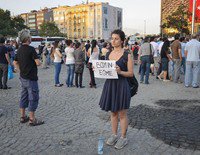 After the police withdrew from Gezi Park, it turned into a place where the society could raise its demands for justice, democracy and freedom for 15 days.
After the police withdrew from Gezi Park, it turned into a place where the society could raise its demands for justice, democracy and freedom for 15 days.
The park was evacuated with the police intervention on June 15.
Investigations were launched against voluntary health workers who did first aid on the ones who were injured in police attacks. They were accused of "medical intervention of the ones injured in illegal demonstrations."
Erdoğan thanked the then Minister of Interior, İstanbul Governor and Security Directorate for the police intervention against the protesters. "Using pepper spray is the most natural right of the police, you cannot criticize my police," he said. In his later statements, he also contended that "the police fared quite well in the test of democracy" and "wrote an epic of heroism."
11 people lost their lives
According to the figures shared by the Ministry of Interior, 2.5 million people in total joined the protests.
11 people lost their lives in incidents related with the law enforcement: 11-year-old Berkin Elvan, 21-year-old Hasan Ferit Gedik and 20-year-old Mehmet Ayvalıtaş in İstanbul; 19-year-old Ali İsmail Korkmaz in Eskişehir; 26-year-old Ethem Sarısülük in Ankara; 22-year-old Abdullah Cömert and Ahmet Atakan in Antakya and 18-year-old Medeni Yıldırım in Diyarbakır.
Lawsuits filed against protesters
By the end of 2013, lawsuits had been filed against 308 people based on 40 separate indictments. Almost 200 people were also put on trial on the allegation that "they entered the Bezm-i Alem Valide Sultan Mosque in Beşiktaş with their shoes on and drank beer there."
The lawsuits filed against Gezi protesters were not limited to these. The cases brought against protesters all around Turkey continued for years. Some of them are still ongoing today.
The most recent of these cases was the one against 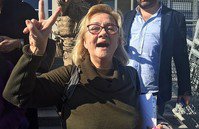 Osman Kavala, Mücella Yapıcı, Can Atalay, Tayfun Kahraman, Ali Hakan Altınay, Yiğit Aksakoğlu, Yiğit Ali Ekmekçi, Çiğdem Mater Utku, Mine Özerden, Can Dündar, Mehmet Ali Alabora, Ayşe Pınar Alabora, Gökçe Tüylüoğlu, Handan Meltem Arıkan, Hanzade Hikmet Germiyanoğlu and İnanç Ekmekçi. They faced a lawsuit due to Gezi Resistance 6 years later.
Osman Kavala, Mücella Yapıcı, Can Atalay, Tayfun Kahraman, Ali Hakan Altınay, Yiğit Aksakoğlu, Yiğit Ali Ekmekçi, Çiğdem Mater Utku, Mine Özerden, Can Dündar, Mehmet Ali Alabora, Ayşe Pınar Alabora, Gökçe Tüylüoğlu, Handan Meltem Arıkan, Hanzade Hikmet Germiyanoğlu and İnanç Ekmekçi. They faced a lawsuit due to Gezi Resistance 6 years later.
While all of the defendants were acquitted in the last hearing of the case, President Erdoğan referred to the verdict of acquittal in following words:
"Look, it is not a simple incident of uprising. There are those types stirring up trouble to provoke some countries behind the scenes, as Soros does. And you know that its Turkey branch was behind bars. They attempted to acquit him with a maneuver yesterday. Whoever defines those incidents as an innocent environmental movement is an enemy of the country and the nation. We ended the Gezi incidents, which aimed to divide the country, by standing shoulder to shoulder with our nation."
Shortly after Erdoğan uttered the above remarks, the Council of Judges and Prosecutors (HSK) launched an investigation and inquiry against the judges who gave a ruling of acquittal in Gezi trial.
When the court handed this verdict, businessperson and rights defender Osman Kavala had been behind bars for 840 days. Though the court also ruled for his release, before he could leave Silivri Prison, he was arrested again based on other charges and investigations. Accused of financing Gezi protests, Kavala has been in prison for 940 days now.
Artillery Barracks could not be built
Erdoğan said over and over again that the Artillery Barracks would be constructed in place of Gezi Park. It has been seven years. But no concrete steps have been taken. (HA/SD)






